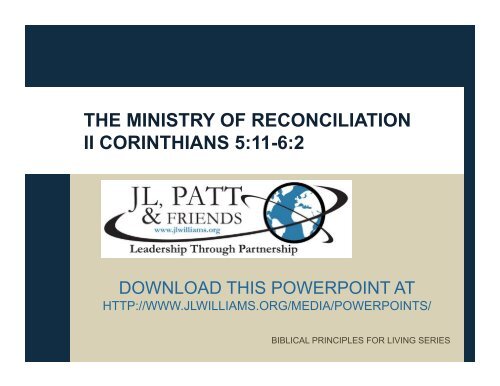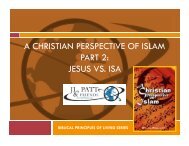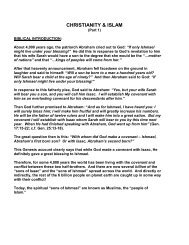THE MINISTRY OF RECONCILIATION II CORINTHIANS 5:11-6:2
THE MINISTRY OF RECONCILIATION II ... - JLWilliams.org
THE MINISTRY OF RECONCILIATION II ... - JLWilliams.org
You also want an ePaper? Increase the reach of your titles
YUMPU automatically turns print PDFs into web optimized ePapers that Google loves.
<strong>THE</strong> <strong>MINISTRY</strong> <strong>OF</strong> <strong>RECONCILIATION</strong><br />
<strong>II</strong> <strong>CORINTHIANS</strong> 5:<strong>11</strong>-6:2<br />
DOWNLOAD THIS POWERPOINT AT<br />
HTTP://WWW.JLWILLIAMS.ORG/MEDIA/POWERPOINTS/<br />
BIBLICAL PRINCIPLES FOR LIVING SERIES
Since, then, we know what it is to fear the Lord, we try to<br />
persuade others. What we are is plain to God, and I hope it<br />
is also plain to your conscience. We are not trying to<br />
commend ourselves to you again, but are giving you an<br />
opportunity to take pride in us, so that you can answer<br />
those who take pride in what is seen rather than in what is<br />
in the heart. If we are “out of our mind,” as some say, it is<br />
for God; if we are in our right mind, it is for you. For<br />
Christ’s love compels us, because we are convinced that<br />
one died for all, and therefore all died. And he died for all,<br />
that those who live should no longer live for<br />
themselves but for him who died for them and was raised<br />
again.
So from now on we regard no one from a worldly point of<br />
view. Though we once regarded Christ in this way, we do<br />
so no longer. Therefore, if anyone is in Christ, the new<br />
creation has come: The old has gone, the new is here! All<br />
this is from God, who reconciled us to himself through<br />
Christ and gave us the ministry of reconciliation: that God<br />
was reconciling the world to himself in Christ, not counting<br />
people’s sins against them. And he has committed to us<br />
the message of reconciliation. We are therefore Christ’s<br />
ambassadors, as though God were making his appeal<br />
through us. We implore you on Christ’s behalf: Be<br />
reconciled to God. God made him who had no sin to be sin<br />
for us, so that in him we might become the righteousness<br />
of God.
As God’s co-workers we urge you not to receive God’s<br />
grace in vain. For he says,<br />
“In the time of my favor I heard you,<br />
and in the day of salvation I helped you.”<br />
I tell you, now is the time of God’s favor, now is the day of<br />
salvation.<br />
<strong>II</strong> Corinthians 5:<strong>11</strong>-6:2
1. PURPOSE <strong>OF</strong> <strong>RECONCILIATION</strong><br />
A. Reconciliation presupposes alienation<br />
B. If there were no broken relationships…division…hostilities…<br />
alienations…estrangements – there would be no need of<br />
reconciliation.
But our world and churches are filled with chasms of separations between<br />
hostile people…tribal groups…ethnic groups…family members…married<br />
couples.<br />
<br />
So the purpose of reconciliation is to bring peace between the estranged…<br />
hostile…warring parties.<br />
<br />
So the purpose of reconciliation is to eliminate the alienation.
2. PASSION <strong>OF</strong> <strong>RECONCILIATION</strong><br />
A. “Since then, we know what it is to fear the Lord…” (<strong>II</strong> Cor.<br />
5:<strong>11</strong>)<br />
B. Psalm 36:1 says that the wicked person has “no fear of God<br />
before his eyes.”
C. The righteous have a holy, reverential fear of God that causes them to want<br />
to please Him – while the wicked have no such “fear of God.”<br />
D. When man does not have a healthy and holy fear of God, then he lives to<br />
please himself and gratify his flesh – regardless of who he hurts.<br />
E. But when a person truly fears God, then he will live to please Him – and<br />
maintain peace.
F. Paul earlier said: “…we make it our goal to please Him…” (v.9)<br />
G. In all other religions, the person has to appease the gods of wrath and<br />
anger; but in Christianity we live to please the God who loves us!<br />
“…equip you with everything good for doing His will, and may He<br />
work in us what is pleasing to Him, through Jesus Christ, to whom<br />
be glory for ever and ever. Amen.” (Hebrews 12:21)
H. Further, Paul says that:<br />
“…we must all appear before the judgment seat of Christ, that each<br />
one may receive what is due him for the things done while in the<br />
body, whether good or bad.” (v. 10)<br />
I. So the Christian is to have a holy passion to live in such a way that will be<br />
pleasing to God – so that when he individually stands before the Judgment<br />
seat of Christ, he will hear: “Well done, good and faithful servant!”<br />
J. So the passion of reconciliation is the fear of God that motivates us to live a<br />
life that will please Him.
3. PERSUASION <strong>OF</strong> <strong>RECONCILIATION</strong><br />
A. “knowing what it is to fear the Lord, we try to persuade<br />
men” (v.<strong>11</strong>).<br />
B. Before we are Christians, we live to please ourselves and<br />
please others. We are “men-pleasers” rather than “God<br />
pleasers.” (Col. 1:10)
C. When we “fear men” rather than “fear God,” it always is a snare to us (Prov.<br />
29:25). We allow men to persuade us – rather than us persuade them out<br />
of our fear of God.<br />
D. The word that Paul uses here for persuade is a significant and strong word.<br />
It is the word peitho, and means: “to apply persuasion, to prevail upon, to<br />
win over; bringing about a change of mind by the influence of reason or<br />
moral persuasion.” So Paul was not at all passive in his persuasion!<br />
E. So if we are going to be ministers of Reconciliation – it will not be easy. It<br />
will take great effort and persuasion through the power of the Holy Spirit!
4. PURITY <strong>OF</strong> <strong>RECONCILIATION</strong><br />
A. “What we are is plain to God and I hope it is also plain to your<br />
conscience” (v. <strong>11</strong>)<br />
B. Paul says that in his ministry of Reconciliation – there are no<br />
hidden agendas…secret motives…unseen motivations.
C. Paul said: “I am transparent to God and transparent to man.”<br />
D. When people of the world go about reconciliation – when politicians take<br />
the lead in it – there is always a hidden agenda. There is almost always<br />
some secret, self-serving motivation.<br />
E. But for the Christian, the motive is purely one of peace!<br />
“Therefore, since through God’s mercy we have this ministry we do<br />
not lose heart. Rather, we have renounced secret and shameful<br />
ways; we do not use deception, nor do we distort the word of God.<br />
On the contrary, by setting forth the truth plainly we commend<br />
ourselves to every man’s conscience in the sight of God.” (<strong>II</strong> Cor.<br />
4:1-2)
F. Paul’s motives as an apostle were being questioned by some in the church<br />
at Corinth – who had been influenced by other so-called “super apostles”<br />
who were undermining his ministry.<br />
G. These false religious leaders took pride in external things – while Paul was<br />
concerned about the unseen things of the heart:<br />
“We are not trying to commend ourselves to you again, but are<br />
giving you an opportunity to take pride in us, so that you can<br />
answer those who take pride in what is seen rather than what is in<br />
the heart” (v. 12)
H. So Paul knew that heart purity is the real issue. He knew that the content of<br />
the heart would be fully revealed at the Judgment Seat of Christ.<br />
“Therefore judge nothing before the appointed time; wait till the<br />
Lord comes. He will bring to light what is hidden in the darkness<br />
and will expose the motives of men’s hearts. At that time each will<br />
receive his praise from God.” (I Cor. 4:5)<br />
I. So we must all examine our hearts! But we must also realize that there has<br />
been only one Person who had perfectly pure motives – and that was the<br />
Lord Jesus! All of the rest of us have mixed motives…impurities in our<br />
heart.<br />
“For the word of God is living and active. Sharper than any doubleedged<br />
sword, it penetrates even to dividing soul and spirit, joints<br />
and marrow; it judges the thoughts and attitudes of the<br />
heart.” (Hebrews 4:12)
J. However, as we read the Word…mature in the Lord…walk in the Spirit –<br />
our motives are more and more purified. Since God’s Spirit is the Holy<br />
Spirit, He will increasingly sanctify and purify our hearts.
5. PREREQUISITE <strong>OF</strong> <strong>RECONCILIATION</strong><br />
“For the love of Christ compels us…” (v. 14)<br />
A. It is nothing but the agape love of Christ that will motivate us<br />
to be ministers of reconciliation.<br />
B. Through the Holy Spirit, God “…pours out His love in our<br />
hearts.” (Romans 5:5)
C. That agape will not allow us to be silent and inactive in the face of hostility,<br />
alienation and injustice!<br />
D. His love compels us to take action in the direction of reconciliation.<br />
E. The word Paul uses here for “compels” or “controls” is sunecho – a very<br />
strong word! It means: “to hold together, confine, secure, surround, hold<br />
fast.” It is the word that is used of:<br />
<br />
<br />
<br />
“crowds surrounding Jesus”<br />
“soldiers surrounding a city”<br />
“people gripped by a strong desire or emotion.”
F. So without the love of Christ in our hearts – we will not be compelled<br />
toward reconciliation when there is alienation.<br />
G. Without agape, we will be controlled by apathy…indifference…passivity…<br />
inactivity…fear!<br />
H. So the number one prerequisite for being a minister of reconciliation is<br />
agape – the love of Christ!
6. PRICE <strong>OF</strong> <strong>RECONCILIATION</strong><br />
“Christ’s love compels us,<br />
because we are convinced that One died for all…” (v.14)<br />
A. This verse reminds us that there is no such thing as “cheap<br />
reconciliation!”<br />
B. For us to be reconciled to a Holy God took nothing less than<br />
the death of the Lord Jesus!
C. There is no such thing as “cheap grace…bargain-basement salvation…<br />
discounted redemption…reduced reconciliation!<br />
D. Grace is free – but it is not cheap! The price tag for our redemption and<br />
reconciliation is written in blood!<br />
E. So if it was eternally costly for God to reconcile us to Himself – then it will<br />
be costly for us to become seriously involved in the ministry of<br />
reconciliation!
7. PATTERN <strong>OF</strong> <strong>RECONCILIATION</strong><br />
“And He died for all<br />
that those who live should no longer live for themselves<br />
but for Him who died for them and was raised again.” (v. 15)<br />
A. Paul reminds us here that we have a new pattern to live our<br />
lives after – the pattern of self-surrender.
B. We no longer live for ourselves – but for God who purchased us:<br />
“Do you know that your body is a temple of the Holy Spirit, who is<br />
in you, whom you have received from God? You are not your own;<br />
you were bought at a price. Therefore, glorify God with your<br />
body.” (I Cor. 6:19-20)<br />
C. So reconciliation is not just an act – it is life-style. It is not a one-time<br />
intervention – but the pattern we seek to live by.
D. Redemption and reconciliation is both a crisis and a process. Salvation is a<br />
crisis – and sanctification is the process.<br />
E. Through the crisis of redemption, God eternally reconciled us unto Himself<br />
– but that crisis of reconciliation in our lives is to result in a lifelong process<br />
of reconciliation in the lives of others!<br />
F. Tragically, the pattern of most people’s lives is the ongoing process of one<br />
alienation after another. Since their lives are broken spiritually and<br />
emotionally – they inflict that upon everyone around them!
G. What is the pattern of your life – alienation or reconciliation? Are you living<br />
for Him who died for you?<br />
H. Paul said, that once we realize the price that was paid for us – we can “…no<br />
longer live for ourselves, but for Him who died for you.”
8. PERSPECTIVE <strong>OF</strong> <strong>RECONCILIATION</strong><br />
“So from now on we regard no one from a worldly point of view.<br />
Though we once regarded Christ in this way,<br />
we do so no longer.” (v.16)<br />
A. Before his experience on the Damasus Road – Paul had a<br />
radically different perspective on life than the one he<br />
describes here!
B. Before his conversion, Paul viewed every person “…from a worldly point of<br />
view.” That meant they were either Jews or Gentiles…clean or unclean…<br />
chosen or rejected. He and all of humanity neatly divided up and<br />
compartmentalized into “us” and “them” “my side”…“other side!”<br />
C. But God had to temporarily blind him so he could get a new perspective! He<br />
lost his sight – but in the process gained insight!<br />
D. What was this radically new insight that forever changed his sight?
E. It was a new correct understanding of who God is through Jesus Christ.<br />
F. Before his experience on the Road to Damascus, Paul had a wrong view of<br />
Christ. He thought Christ was nothing more than a Jewish heretic who<br />
blasphemed by claiming to be God – and got what He deserved –<br />
crucifixion!<br />
G. But on the Damascus Road he met the risen Christ – and both his insight<br />
and sight were forever changed!<br />
H. His new insight about Christ transformed his sight of all mankind. His<br />
spiritual insight – gained while he was temporarily blinded – gave him new<br />
physical sight.
PRINCIPLE<br />
I. If our insight about God is wrong – our sight of man will also be wrong! It is<br />
impossible to have a wrong view of God and have a right view of man!<br />
J. Once we are transformed by the love of Christ – we can no longer “view<br />
any person from a worldly point of view.” We see people through the lenses<br />
of Grace. We see them from God’s perspective…we see them through the<br />
eyes of Christ!
J. The Cross changes our perspective! It crosses out our human…carnal…<br />
fleshy…worldly point of view – and gives us a spiritual point of view.<br />
K. The blood of Calvary not only cleanses our sins; it clears our vision. The<br />
blood of Christ washes our hearts of sin – and our eyes or prejudice.<br />
L. Agape love helps us see every person through their potential in Christ<br />
through the new birth! The Gospel is “Good News” that results in “good<br />
views!”
9. POWER <strong>OF</strong> <strong>RECONCILIATION</strong><br />
“Therefore, if anyone is in Christ, he is a new creation;<br />
the old is gone, the new has come.” (<strong>II</strong> Cor. 5:17)<br />
A. Paul had a new perspective – that the power of Christ could<br />
transform anyone into a new creation!
B. Paul knew if the power of the Gospel could transform him – who had been<br />
a blasphemer of Christ…a persecutor of the church…a murderer of<br />
Christians (Acts 8:1; 9:1; I Tim. 1:13) – then it could transform anyone!<br />
C. From personal experience, Paul knew that this was not some new religious<br />
system based on reformation – but the very power of God for<br />
transformation. He already knew the folly and frustration of trying to reform<br />
himself through his own efforts…through good works…through obedience<br />
to the law.<br />
D. On the Damascus Road, he was not reformed from the outside in; he was<br />
transformed from the inside out!
E. This transforming power did not come from the ethical ideals of a dead<br />
religious leader; it was from the risen and reigning Christ!<br />
F. Paul now knew from personal transforming experience – that the power of<br />
Christ could make anyone a new creature…a new creation!<br />
G. That’s why he wrote the Christians at Rome:<br />
“I am not ashamed of the Gospel because it is the power of God for<br />
the salvation of anyone who believes…” (Rom. 1:16)
H. Only the Gospel has the power of God to reconcile lives. The Gospel is<br />
“Good News” because it not only reconciles us to God; it also reconciles us<br />
to others.<br />
I. That’s why all of the worldly attempts at reconciliation – as sincere and wellintended<br />
as they may be – never last. Pacts are signed…peace accords<br />
are ratified – only to soon to be broken! Why? Because there is no<br />
transformation backing the reconciliation. There is no spiritual power to<br />
perpetuate the peace!<br />
J. Only the Gospel of Christ has the power to bring lasting reconciliation.<br />
K. Only when there has been eternal reconciliation with God through the<br />
power of the Gospel, can there be temporal reconciliation between men!
10. PERSON <strong>OF</strong> <strong>RECONCILIATION</strong><br />
“All of this is from God,<br />
who reconciled us to Himself through Christ…” (v. 18)<br />
A. Paul reminds us that this entire ministry of reconciliation does<br />
not originate with man – but with God;<br />
B. Reconciliation is not a principle – but a person. It is not a<br />
theology…a theory…a philosophy…a movement – it is a<br />
person!
C. Reconciliation is not a human inclination – but rather a divine incarnation.<br />
D. It is absolutely impossible for reconciliation to occur where there is<br />
alienation without the intervention of a person. Reconciliation cannot take<br />
place abstractly or theoretically. Reconciliation must become an<br />
incarnation. Someone must stand in the gap of alienation. Some reconciler<br />
must personally incarnate the reconciliation.<br />
E. So the glory of the Gospel is that Jesus Christ – the Incarnate God, brought<br />
reconciliation to the world! Reconciliation was personally incarnated in Him<br />
– and it is to be continued through us as His Body.<br />
F. That brings us to our next point…
<strong>11</strong>. PROCLAMATION <strong>OF</strong> <strong>RECONCILIATION</strong><br />
“All this is from God,<br />
who reconciled us to himself through Christ<br />
and gave us the ministry of reconciliation…<br />
He committed to us the message of reconciliation” (v. 18-19).<br />
A. Paul now turns the spotlight from the life and ministry of the<br />
Lord Jesus – to us. Just as Jesus was God’s incarnate Word<br />
about reconciliation; you and I are to continue to speak and<br />
incarnate the word of reconciliation.
B. The church has been entrusted with the ministry and message of<br />
reconciliation. That’s why Paul speaks of us Christians as “…Christ’s<br />
ambassadors” (v. 20).<br />
C. In the same way, Paul tells us that the church is God’s Embassy here on<br />
earth. Therefore, the church is a small microcosm of the Kingdom of God<br />
here on earth! The church is God’s Embassy in a hostile and alienated<br />
world. And, you and I are God’s ambassadors who represent Him in a lost<br />
and dying world!
D. Question: “What do people sense when they step into your church? What<br />
do people experience when they step into your home as God’s<br />
Ambassadorial residence?” Do they sense a place of spiritual peace and<br />
reconciliation – or worldly alienation? Do they experience reconciled<br />
relationships, or the same hostility and ethnicity that they experience in the<br />
world? Is your physical home and spiritual home a place where the<br />
presence of God…the peace of the Lord Jesus…the power of the Holy<br />
Spirit reign supremely?
E. So Paul reminds us that we as Christians have been given the ministry of<br />
reconciliation – the words of reconciliation. That means that in any situation<br />
of alienation, I have the power to either be silent and allow the alienation to<br />
become worse; or speak hostility and intensify the alienation; or speak<br />
words of reconciliation – and bring healing of relationships.<br />
F. The Apostle James reminds us that “…the tongue is a fire” (3:3-6). It so<br />
often ignites forest fires of alienation and hostility between people. That’s<br />
why the most powerful and dangerous force in the world is the tongue!
G. It is my prayer that God would sanctify our tongues so that they would from<br />
this moment on speak only words of reconciliation!<br />
H. Paul said: “Let your conversation be always full of grace, seasoned with<br />
salt, so that you may know how to answer everyone” (Col. 4:6).<br />
I. God help each of us to let His Holy Spirit sanctify our tongues, so that we<br />
would only speak those words which edify and produce reconciliation. “For<br />
the Kingdom of God is not a matter of eating and drinking but of<br />
righteousness, peace and joy in the Holy Spirit” ( Rom. 14:17)<br />
J. However, when that is our commitment, it will not be easy or cheap! That<br />
reminds us of our next point…
12. PAIN <strong>OF</strong> <strong>RECONCILIATION</strong><br />
“God was reconciling the world to Himself in Christ,<br />
not counting men’s sins against them…<br />
God made Him who had no sin to be sin for us…” (vs. 19, 21)<br />
A. Here again we see how the ministry of reconciliation becomes<br />
very personal and painful.
B. We have already seen that the price of reconciliation was nothing short of<br />
the death of the Lord Jesus. It was not painless for God to bring about<br />
reconciliation. The reconciliation of the world was only made possible by<br />
the shame and pain of the cross!<br />
C. However, the crucifixion of Christ was not the total picture of reconciliation.<br />
Many people before and after Christ were crucified – and died horribly<br />
painful deaths on cruel Roman crosses. It was not just the physical pain of<br />
the cross that killed Jesus. It was the spiritual pain and shame of yours and<br />
my sin that killed Christ! It was when “…God made Him who knew no sin to<br />
be sin for us” that Christ died spiritually! That was the hell of the cross!
D. We can’t even begin to imagine what it must have been like for incarnate<br />
love to be “…made sin.” Up until this point on the cross, there had never<br />
been a moment in time or in eternity when the Father and Son had known<br />
anything but perfect unity. But on the cross, the Father put all of the sins of<br />
the world on His sinless Son – all because of grace, mercy and love! It was<br />
during those 3 eternally long hours – between 12:00 - 3:00 PM when Christ<br />
was suspended on the cross in both spiritual and physical darkness – that<br />
He experienced and endured the real pain of reconciliation! That’s what<br />
really killed the Lord Jesus – your sins and mine! He did not die from a<br />
broken body – but from a broken heart!
E. Sin was totally alien to the life and nature of the Lord Jesus – yet He took it<br />
upon Himself. Because of love, He incorporated sin into His holy being. He<br />
personalized and personified sin – and died as a result of it. And He did it<br />
all for you and me!
F. What does that tell you and me about the ministry of reconciliation? It<br />
assures us that if we are going to be serious about the ministry of<br />
reconciliation – then it is also going to be costly and painful for us! If we are<br />
going to step into the chasm of alienation and do the Christ-like thing – then<br />
we will also have to be willing to take the shame and pain of other people’s<br />
sin upon ourselves. Unless we too are willing to personalize the problem,<br />
and become identified with the pain and shame other people are<br />
experiencing – reconciliation will not occur.
H. So Jesus became personally identified with our sin – so that we could<br />
become personally identified with His righteousness. That brings us to our<br />
next point, the…
13. PERFUME <strong>OF</strong> <strong>RECONCILIATION</strong><br />
“God made Him who knew no sin to be sin for us,<br />
so that we might become the righteousness of God” (v. 21)<br />
A. The Bible reminds us that we are all born into a state of<br />
spiritual death. As Paul says, we are all “…dead in our<br />
trespasses and sin” (Eph. 2:1).
B. When something is dead, it decomposes…it rots…it stinks – it is offensive<br />
to our noses. In the same way, the Bible assures us that our sin is offensive<br />
to the senses of God.<br />
C. However, through our faith in Christ Jesus, we have “…passed from death<br />
to life” (Jn. 5:24). Now that we are “…in Him,” we are no longer dead in our<br />
trespasses and sin. We have “…become the righteousness of Christ.” We<br />
now smell like the Lord Jesus!
D. I love those graphic verses in <strong>II</strong> Corinthians 2:14-16, where Paul says:<br />
“Thanks be to God, who always leads us in triumphal procession in<br />
Christ and through us spreads everywhere the fragrance of the<br />
knowledge of Him. For we are to God the aroma of Christ among those<br />
who are being saved and those who are perishing. To the one we are<br />
the smell of death; to the other, the fragrance of life.
E. These verses take us back to the Old Testament sacrifices – especially in<br />
the Book of Leviticus. Every time a sacrifice by fire was carried out<br />
according to God’s precise instructions, these words of description would<br />
follow: “…it was an aroma pleasing to the Lord” (Lev. 1:9, 13, 17, etc).<br />
F. So Paul reminds us that when we too die to self, and live for Christ (Gal.<br />
2:20), then our lives are the “…fragrance of Christ unto God.” Everywhere<br />
Christ went, He spread the fragrance of God. In like manner, everywhere<br />
you and I go we are to spread the fragrance of Christ!
G. Let me ask you a question: “What do you smell like to God? Who do you<br />
smell like to the people you live and work with? Are you the fragrance of<br />
Christ – the fragrance of life? Or are you the noxious odor of death and<br />
decay?”<br />
H. When I called my wife from London on my flight to Ethiopia, she asked if I<br />
would buy her a particular kind of perfume that she likes – and that I also<br />
like. My nose has come to associate that particular perfume with Patt. It<br />
reminds me of her love. So I am going to buy a BIG bottle on my return trip<br />
home through London!<br />
I. So the Bible reminds us that we are to be the perfume of Christ to a lost<br />
and dying world. We are to be the aroma of reconciliation everywhere we<br />
go.
J. What does your church smell like? What kind of spiritual and relational odor<br />
arises from the fellowship and worship of your local church body? When<br />
people come to your church, what do they smell? Are they drawn by the<br />
fragrance of Christ and His righteousness and reconciliation? That’s how<br />
the true saints of God are supposed to smell! We are to be God’s perfume<br />
of righteousness and reconciliation in the world of sin and alienation!<br />
K. That brings us to our last point in this study, the…
14. PLEA <strong>OF</strong> <strong>RECONCILIATION</strong><br />
A. Even though the chapter ends in our Bibles with verse 21,<br />
that is not the conclusions of Paul’s message about<br />
reconciliation. Chapter 6 is a continuation of Paul’s theme<br />
about the ministry of reconciliation. He gives a final<br />
passionate plea for reconciliation:<br />
“As God’s fellow workers we urge you not to receive God’s<br />
grace in vain…I tell you, now is the time of God’s favor, now<br />
is the day of salvation” (6:1-2).
B. In essence Paul says: “Since we have been reconciled to Christ; since we<br />
are now the fragrance of Christ; since we have received the righteousness<br />
of Christ; since we have been given the ministry of reconciliation – I urge<br />
you not to receive God’s grace in vain!”<br />
C. Why does he say this? Because now is the time of God’s favor! Now is the<br />
time of God’s salvation!<br />
D. Unless we move from information to application, we are guilty of<br />
“…receiving God’s grace in vain.”









